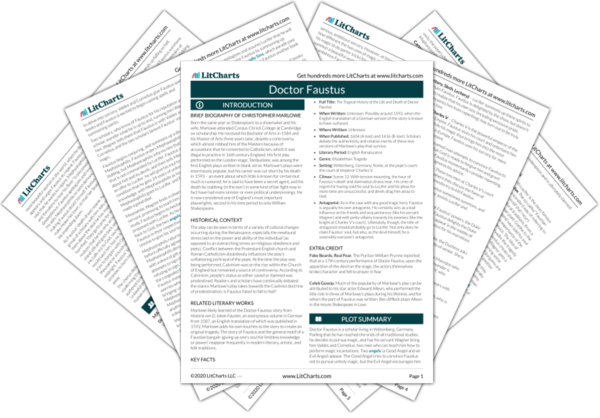In addition to the Renaissance more generally, the Protestant reformation and questions surrounding the changing nature of European Christianity in Marlowe's time have a profound influence on Doctor Faustus. One such question that the play tackles is the issue of predestination. According to Calvinism (a branch of protestant Christianity started by John Calvin), people are predestined to be either saved in heaven or damned in hell. In other words, they are born fated to go to one or the other and there's nothing they can do to change that.
One overarching question in Marlowe's play is whether Faustus' fall from grace is his own fault or whether he is fated to be damned. (The question can be extended also to Lucifer and his renegade angels-turned-devils: were they fated to fall from heaven to hell?) Faustus seems to choose his own path, voluntarily agreeing to his deal with Lucifer. And he appears to have the choice to repent at any moment in the play. But, according to a Calvinist interpretation, such free will is an illusion, as these “choices” are already predetermined by God. Even the two versions of the play can't seem to agree on an answer. In a crucial line, the A-text has the Good Angel tell Faustus it is “Never too late, if Faustus will repent,” (V, 253). The B-text reads, “Never too late, if Faustus can repent.” In one version, the only question is whether Faustus “will” or will not repent. In the other, it is questionable whether Faustus even has the option (“can” or can't he repent?). Regardless, that the play engages in this kind of questioning at all suggests that there may be limits to and constraints upon free will.
Fate vs. Free Will ThemeTracker

Fate vs. Free Will Quotes in Doctor Faustus
...Till, swollen with cunning, of a self-conceit,
His waxen wings did mount above his reach,
And melting heavens conspired his overthrow.
For falling to a devilish exercise,
And glutted more with learning's golden gifts,
He surfeits upon cursed necromancy. (20-25)
I am a servant to great Lucifer,
And may not follow thee without his leave;
No more than he commands must we perform. (40-42)
On God, whom Faustus hath blasphemed? Ah my God—I would weep, but the devil draws in my tears! gush forth blood, instead of tears—yea, life and soul! O, he stays my tongue! I would lift up my hands, but see, they hold them, they hold them! (27-31)
O I'll leap up to my God! Who pulls me down?
See, see where Christ's blood streams in the firmament!
One drop would save my soul, half a drop: ah my Christ. (69-71)
















